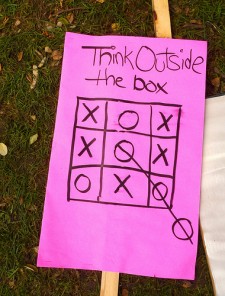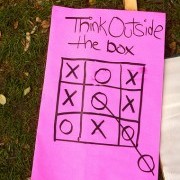 Photo: Martin ReisWhen I first heard about Occupy Wall Street (henceforth OWS), I was dismissive. Worse, I was dismissive in a smug, insider, hippie-punching sort of way. I immediately put it into a box: confused and easily dismissed lefty protests filled with Free Mumia signs, giant puppets, and drum circles. As it turned out, I was right about the drum circles, but wrong about pretty much everything else.
Photo: Martin ReisWhen I first heard about Occupy Wall Street (henceforth OWS), I was dismissive. Worse, I was dismissive in a smug, insider, hippie-punching sort of way. I immediately put it into a box: confused and easily dismissed lefty protests filled with Free Mumia signs, giant puppets, and drum circles. As it turned out, I was right about the drum circles, but wrong about pretty much everything else.
My sin was not so much that I put OWS in the wrong box, but that I was so eager to box it at all. The most amazing thing about the entire phenomenon, to me, is how long and how totally it has resisted simple categorization. That is a rare thing in this era of late capitalism, when everything is instantly branded and marketed to death. The introduction of genuine novelty, of possibility, is a precious thing of great power; I should have recognized that.
I’ve been struggling for the right metaphor, and I keep coming back to wave function collapse (physics produces all the best metaphors). In quantum mechanics, a wave function is superposition of several possible endstates. When it is measured, it collapses, transforming from several possibilities to one actuality. Putting it more poetically: a jumble of possibilities, when observed from a particular perspective, becomes a single reality.
Something (metaphorically) similar happens when we create social meaning. It’s not that OWS “really” means one thing or another and we’re trying to discover that meaning; it’s that OWS potentially means all sorts of things and we are, via our competing narratives and interpretations, choosing that meaning.
What’s amazing is that, sociopolitically speaking, OWS is a wave function that still has not collapsed. (Starting to realize how dorky this metaphor sounds.) Despite the thousands of words that have been spilled analyzing it and defining it from this angle and that, it is not yet any particular kind of thing. It has not resolved into a familiar model — not quite a protest, not quite a physical occupation of public spaces, not quite a movement, not quite anything. It remains, in short, a jumble of possibilities.
I was chastened by my boneheaded initial attempt to categorize it, so for the most part I’ve just been watching. But every single day, I’ve expected the OWS waveform to collapse, for the whole thing to settle into a familiar narrative that the media and public can feel comfortable with (and dismiss). Yet it still hasn’t. That has been the source of its power.
This is not to engage in obscurantism or say that the particulars can’t be understood. Alexis Madrigal, in what is easily the best thing I’ve read on OWS since it started, maps out its practices, strategies, and ideas quite well. But even as its particulars become clear, the whole, the gestalt, remains fuzzy and evolving. It has none of the hooks or handles that late capitalism typically snags on to in order to commodify discontent and render it toothless.
How has it pulled that off?
First, there are no leaders to co-opt. No one “founded” OWS. Unlike the Tea Party, which at every turn was funded, supported, and amplified by conservative institutions (Americans for Prosperity, Fox News), OWS cannot be traced back to establishment players. The people who served as the catalyst — the folks at Adbusters and the original core of activists — seem as bemused as everyone else at how it’s grown and evolved. It has been almost entirely spontaneous, resisting all efforts at sponsorship or co-optation.
Second, despite the incessant calls from pundits, it has no list of demands that can be negotiated down to a nub in the money-soaked world of transactional politics. I think pundits like Julian Sanchez and Will Wilkinson are off base in calling for OWS to return to normal politics, to start grinding away at raising money and supporting candidates. Many of the people participating in OWS are involved in politics in various ways. And sure, I’m all for people getting politically active, voting at a minimum. But OWS is not that. It is orthogonal to party politics and reflects something deeper. It has just one, indivisible demand: a better, more humane, more just world. We need that demand out there, even as other groups fight for more specific policies and politicians.
Rolling Stone‘s Matt Taibbi, another liberal pundit whose initial reaction to OWS was to suggest a list of demands, has since articulated the evolution of his thinking in “How I Stopped Worrying and Learned to Love the OWS Protests.” He says:
Occupy Wall Street was always about something much bigger than a movement against big banks and modern finance. It’s about providing a forum for people to show how tired they are not just of Wall Street, but everything. This is a visceral, impassioned, deep-seated rejection of the entire direction of our society, a refusal to take even one more step forward into the shallow commercial abyss of phoniness, short-term calculation, withered idealism and intellectual bankruptcy that American mass society has become. If there is such a thing as going on strike from one’s own culture, this is it. And by being so broad in scope and so elemental in its motivation, it’s flown over the heads of many on both the right and the left.
I think that’s about half right. OWS is a raw cry of discontent, not only with tax policy or campaign-finance law or financial regulations, but with the lack of opportunities for real meaning and community in late capitalism. It is also, however, in its egalitarian, consensus-based structure, an attempt to model a different kind of world.
Obviously people camping in a public park, living on donations, are not realistically — and do not see themselves as — a literal example of a sustainable social structure. They merely seek to assert that an alternative is possible, that it’s possible for people to engage with one another as equals, as autonomous citizens, rather than “consumers” or “constituents.” This isn’t the first social movement to aspire to be a kind of civic experiment, but modern communications have made it radically easier to organize and communicate in this “flat,” leaderless, consensus-based way.
There seems to be a general agreement that after the eviction from Zuccotti Park last week, OWS has reached some kind of inflection point. Permanent camps in parks and public spaces across the country are probably not a wise or practical option. So everyone is asking: What now?
The thing is, no one knows. Or at least the usual political pundits don’t know. My own cynical expectation is that the waveform will collapse, that sooner or later this will come to be seen as just another marginal leftie protest. I really, really hope I continue to be wrong. It has defied expectations and predictions at every turn, so who knows?
Rather than guessing what will happen next or telling OWS what to do or demand, it might instead behoove those of us with a public platform to make use of the door that OWS has cracked open. Let’s start thinking more deeply than win-the-morning politics usually allows about what a better world would look like.



